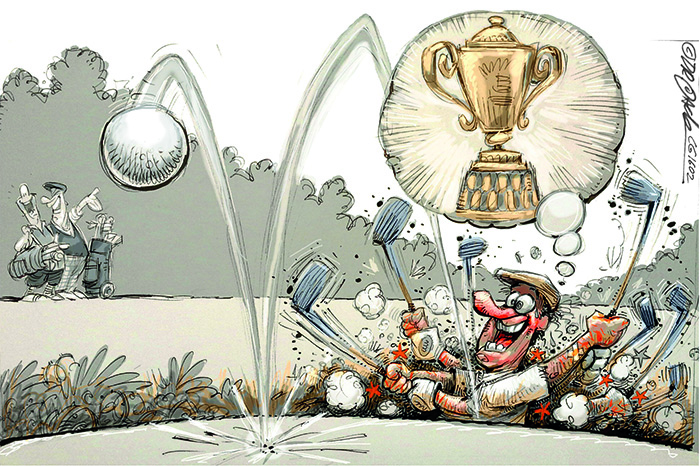Getting the ball rolling
By Peter Corrigan
‘Hackers of the world unite, we’ve nothing to lose but our balls’. That is the title of the book I haven’t written yet and it serves as a rallying cry for those I consider the most put-upon participants in sport – the less than gifted golfers.
Bad players abound in every sport but those who choose golf as the game to flop at do not get a fair deal. As a veteran of a thousand humiliations on golf courses around the world, I can speak from sad experience.
‘Why bother’ is the inevitable question and the only answer is ‘because I enjoy it’. And, despite all the frustrations and the mockery, that’s why a hacker plods on.
It couldn’t happen in any other sport. If you were a useless rugby player, footballer or cricketer no team would pick you; a hopeless tennis player struggles to get a game; a slow runner soon tires of finishing last; a poor fisherman gets fed up with calling into the fishmongers on the way home.
But in golf, no one is in a hurry to advise you to stop wasting your time. On the contrary, poor golfers are positively encouraged to carry on their relentless pursuit of an improvement highly likely to be beyond their capabilities.
Golf also possesses the finest handicapping system which allows the worst player a chance if his opponent is having an off-day. But the system hasn’t always been as generous as it should be.
The game itself plays a part in the beguilement. Even during the most disastrous rounds the wildest of swings can once or twice connect and send the ball soaring down the fairway. If this happens towards the end of round, as it invariably does, the poor wretches convince themselves that the crusade is still worth pursuing.
And golf is dependent on the millions who are hooked on that forlorn hope. It is not too far-fetched to claim that without hackers golf would not quite be the wealthy, worldwide game it is.
They comprise a market desperate for improvement and an easy target for manufacturers of clubs that promise to send your ball further and straighter and of the balls that vow to travel greater distances; the teaching pros, the instruction videos, the magazines that offer pages of advice, the aids the gimmicks … a vast industry that thrives on selling dreams.
Every golf club has a healthy share of hackers and, mocked as they may be, they play an important part in club life. Apart from paying the same subscriptions as everyone else, they make only rare interruptions to the regular flow of prizes to the better players, support the pro’s shop and generally spend more in the bar drowning their sorrows.
If they all decided to end their torment and pack it in, golf would be the poorer, literally. That’s not likely to happen. We play golf because we love it and amid all our threshing about there burns an unquenchable optimist that we are going to improve.








